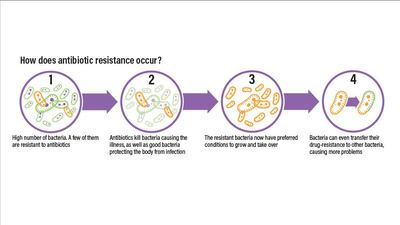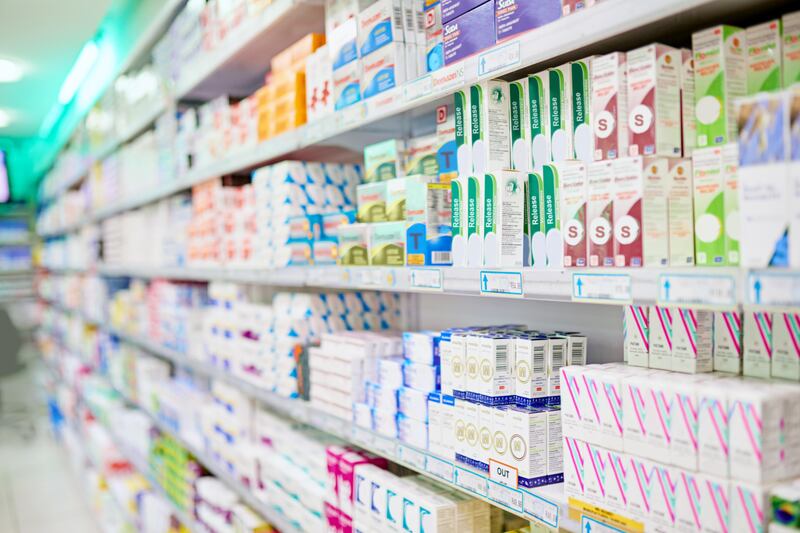A new crackdown on pharmacists who dispense antibiotics and other drugs without prescriptions has been welcomed by doctors.
The Ministry of Health and Prevention is promising new laws to stop unauthorised sales of antibiotics, amid growing fears that their overuse worldwide will create drug-resistant bacteria for which there is no treatment.
"This is fantastic news. It should be welcomed by all hospitals," said Dr Lalu Chacko, chief medical officer at Abu Dhabi's Medeor Hospital.
"It is the best news the Ministry of Health could make, because antibiotics are being misused."
As well as creating a new law, the ministry said it will work with local health authorities to more closely supervise and inspect pharmacies across the UAE.
There is particular concern about the estimated 2,400 private pharmacies which operate outside hospital networks, and where unauthorized dispensing of prescription drugs is most prevalent.
The ministry will also seek to make doctors more aware of the need to prescribe antibiotics only when they needed, and to make sure they give accurate doses and the correct strength.
For Dr Sundar Elayaperumal, the tougher rules are: "The best thing that the UAE Government had done," for the issue of over prescribing antibiotics.
But he warned that doctors too often give way to pressure from patients, and particularly the parents of sick children, to give antibiotics when they are not needed.
"Parents feel their children should get the best antibiotics in the world," he said.
_______________
Read more:
National Editorial: We are on the verge of a post-antibiotic era
[ Cancer drug demand is curtailing antibiotic development, pharma companies say ]
[ World Health Organisation report warns antibiotics are running out ]
_______________
Dr Chacko agrees. "You don't need an antibiotic for everything, "he said. "Everything infectious is not bacterial, many are a virus. And an antibiotic here is not going to help you. But doctors are looked down on if they don't prescribe antibiotics."
Over the counter sales of antibiotics and other prescription drugs has long been recognized as a problem in the UAE, even though it is in theory prohibited. Amoxicillin, a general antibiotic used for a wide range of bacterial infections, has been particularly easy to obtain.
A 2014 report from researchers at the Department of Epidemiology at Abu Dhabi University, described the problem as "endemic."
The survey carried out by the department found 96 per cent of respondents had been able to buy drugs without a prescription, even though half understood that they were breaking the law. None said they had been warned by pharmacists that what they were doing could be dangerous to their health.
"It has become acceptable to both pharmacies and their customers to indulge in the practice with impunity, and with no due regard for the law and basic ethics," the report concluded.
Dr Amin Al Amiri, Assistant Undersecretary for Public Health Policy and Licensing at the Department, said that evidence globally showed that between 50 and 80 per cent of germs were showing signs of drug resistance.
The result was an extra 700,000 deaths each year, Dr Al Amiri said. The Ministry he added, was keen to raise awareness among the general population of over prescription of antibiotics, especially to children.

“Increasing resistance to antibiotics is a global health crisis that could disrupt current drug systems and cause severe complications in patients,” he warned.
The World Health Organisation has repeatedly warned about the dangers of drug-resistant bacteria, calling it one of the: “Biggest threats to global health, food security, and development today.”
This month it held World Antibiotic Awareness Week to raise the profile of so-called “superbugs” There have been predictions that as many as 30 million people a year could die by 2050 from bacteria resistant to all known treatments.
Antibiotic resistance is rising to dangerously high levels in all parts of the world. New resistance mechanisms are emerging and spreading globally, threatening our ability to treat common infectious diseases, according to WHO.
Dr Elayaperumal said that as well as cracking down on illegal dispensing, there should be greater understanding among patients about the risks. People who repeatedly use over the counter antibiotics run the risk of developing long term health problems, including diarrhea and severe inflammation of the colon, he said.
“They can lead to a whole list of complications for the patient,” Dr Elayaperumal said.
Dr Chacko said without changes: ”Otherwise it can only go in one direction, and that is that no antibiotic will work. And that is a very bleak future.”






